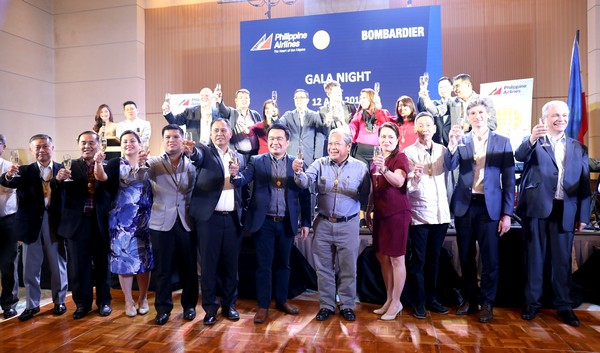
Dr. Jaime J. Bautista, PAL President and COO, leads a toast for the national flag carrier’s win towards being the first 4-Star airline in the country. Dr. Bautista is joined by other PAL and Bombardier executives.
PHILIPPINE Airlines (PAL) will further boost its operations at its hubs in Cebu, Clark and Davao, with the scheduled arrival of 15 new aircraft within 2018, and another six aircraft in 2019.
Now an internationally-certified 4-Star airline, PAL announced a multi-hub expansion strategy that aims to improve domestic and international connections, while spreading the benefits of tourism and commercial activity to the various regions in Mindanao, the Visayas and Luzon.
New routes and hikes in flight frequencies are being introduced as the flag carrier accepts delivery of five additional Next-Generation Bombardier Q400s and six new Airbus A321neos starting in May 2018, along with four Airbus A350-900 trans-oceanic aircraft starting in June 2018.
“We are no longer just a Manila-centric airline,” said PAL President and and Chief Operating Officer Dr. Jaime
J. Bautista. “Our new aircraft and our new hubs are a winning combination that will help expand our market reach both domestically and worldwide.
This is imperative for a global airline, and we must sustain and build on our hard-won 4-Star rating.”
PAL’s 2018 expansion includes the following new routes:
* Davao-Siargao, starting with four weekly flights from last March 25
* Manila non-stop to New York (John F. Kennedy Airport) from Oct. 28
* Manila non-stop to New Delhi and Mumbai (Bombay) in India by last quarter of 2018
* Manila to Sapporo (Chitose) in Japan’s northernmost island of Hokkaido, by last quarter of 2018
The new routes to India are PAL’s response to the call of DOT Secretary Wanda Corazon Teo for a direct link to India, a potentially rich producer of future tourist visitors for the Philippines.
PAL is also assessing the request of DOT Secretary Teo to launch international routes directly from Davao International Airport, possibly to Bangkok
or a point in Japan.
The following PAL routes are seeing increased frequencies:
* Cebu-Siargao, launched only last December, will go twice daily by end of April
* Davao-Tagbilaran increased from four times weekly to daily since March 25
* Davao-Clark to ramp up to daily later in 2018
* Cebu-Bangkok increased by 133 percent from thrice weekly to daily since March 25
* Cagayan de Oro to Clark, to go daily later this year
* Cebu-Busuanga (Coron), from twice to three daily flights since April 26
* Clark-Busuanga (Coron), from four to five daily flights since April 26
* Cebu-Clark, from seven to 10 weekly flights since April 28
Upgrade to widebody A330 or A340 aircraft on more selected Manila-Cebu and Manila-Davao flights.
Additional frequencies between Manila and Dumaguete, Cagayan de Oro, Iloilo, Cebu, Puerto Princesa and Bacolod, starting in April/May.
International connectivity is also improved as PAL offers convenient connections in Cebu for passengers flying from Davao to Tokyo, Narita, Beijing, Seoul and Bangkok.
There are also timely connections in Manila to destinations in Europe (London), the USA, Australia, Japan, the Middle East, China and various Asian countries.
Since late 2017, Davao and Cebu are just one stopover away from Toronto and Auckland for the first time, and the same is now true for Brisbane (since March 28) and later this year for New York, India and Hokkaido.
This is the result of PAL’s decision to eliminate stopovers and go nonstop on more and more international routes.
Some of the frequency increases, particularly from Manila, are designed to compensate for the impending closure of Boracay and to offer vacation travelers alternative holiday destinations.
PAL is presently working with local and foreign government authorities for the green light to operate new or additional tourist-carrying flights from
China, Korea and Taiwan to Puerto Princesa and Cebu, in light of the suspension of many flights from these countries to Kalibo.
The additional China-Cebu and Korea-Cebu flights are intended to feed more tourism travel to Camiguin, Siargao, Coron, Bohol and likewise to Butuan, rather than exclusively to Cebu.
This is one positive multiplier effect of a thriving PAL hub network centered on Cebu Mactan.
PAL currently flies to 16 domestic and seven international points from Cebu, 14 domestic and one international points from Clark, six domestic
points from Davao, and one international destination (Seoul, Korea) from Tagbilaran.
Comprehensive marketing and sales studies are ongoing for the introduction of new destinations in Europe and the US mainland, including Chicago and Seattle.
Aircraft expected to join the PAL fleet in 2019 include two more Next-Generation Q400s, two more A350s and two more A321neos.
“Our current fleet of 85 aircraft is already the largest in the Philippines,” confirmed PAL President Bautista.
“We are aiming for 100 aircraft by 2020, which places us in the category of a major carrier. But we are not merely adding more planes, we are constantly upgrading the cabins, seats, amenities, inflight entertainment and technology. We aspire to ultimately become a 5-Star Global Airline, to be a source of pride for all Filipinos.”
The PAL fleet buildup will continue until year 2024, providing valuable support to the airline’s ascent to the ultimate goal of 5-Star rating by Skytrax, the global airline rating organization.
In February 2018, PAL was certified a 4-Star Global Airline after instituting various innovations and expanding its fleet and route network over a two-year period.
PAL is the country’s first and only 4-Star airline, joining 42 other carriers —such as British Airways, Emirates, KLM, Japan Airlines, Qantas, Thai, etc. —also rated 4-Star.